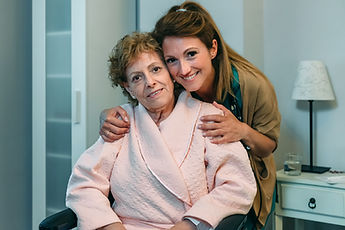BECOME A GUARDIAN
Guardianships are legal actions filed in court. A petition will have to be filed in the circuit court alleging that the named person (18 years or older) needs a guardian and that a named individual or agency be appointed. A signed report by a physician (within 90 days of filing) is required along with the petition. The report must specify the diagnosis and prognosis of the patient as well as a recommendation whether a guardian is necessary, and if so, the extent and scope of guardianship. There are court costs and it is recommended to contact an attorney for assistance.

Family
Guardianship
Family guardianships are no different than any other adult guardianship appointment. The need for a guardian in a family can be a matter of the birth of a child with an intellectual disability, an aging adult having medical issues such as stroke or the development of Alzheimer’s, or the diminished decisional capacity caused by a head injury and other unfortunate causes. The Guardian Manual found under Resources was prepared for family guardians and should be consulted.

State
Guardianship
When appointed by the court pursuant to the “Probate Act of 1975”, approved August 7, 1975, as now or hereafter amended, the State Guardian shall serve as guardian, either plenary or limited; temporary guardian; testamentary guardian; or successor guardian; of the person or the estate, or both, of a ward. If nomination is testamentary the State Guardian shall be notified in writing at the time of the death of the testator. The Office of State Guardian may file a petition for its own appointment, or for the appointment of any other person, if the State Guardian determines that the filing of the petition may avoid the need for State guardianship. In addition, the State Guardian may assist the court, as the court may request, in proceedings for the appointment of a guardian and in the supervision of persons and agencies which have been appointed as guardians.
Public
Guardianship
Public Administrators and Public Guardians in Illinois are appointed for each county by the Governor to four year terms, and they have to be confirmed by the Illinois Senate. The chief judge of the Circuit Court appoints the public guardian in counties with a population of a million or more. They are not paid by the government, except in counties with over a million in population. The Governor may appoint one person to be public administrator and public guardian of several counties. After the appointment, the appointee must become certified as a National Certified Guardian within six months, pay a bond of $5,000, and file an oath in the Circuit Court. Once appointed, an appointee can begin carrying out the duties of public administrator and public guardian. Public Guardians are usually appointed for cases where the assets are greater than $25,000. If assets are below $25,000 the Illinois Office of State Guardian may be appointed depending on the case.
Professional
Guardianship
Professional Guardians are those who are personally named as guardians for unrelated individuals. This category includes both paid staff and volunteer guardians. Many professional guardians are certified by the Center for Guardianship Certification (CGC).

